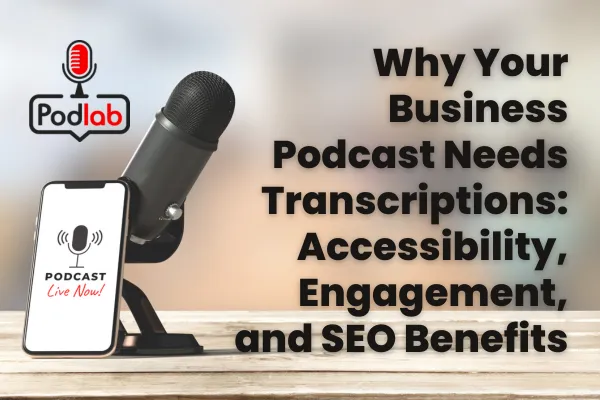PodLab Blog Posts

Why Your Business Podcast Needs Transcriptions: Accessibility, Engagement, and SEO Benefits
Why Your Business Podcast Needs Episode Transcriptions
Podcasting has become a powerful tool for businesses looking to establish themselves as thought leaders and connect with their target audience on a personal level. As a professional podcast producer and strategist, I have seen first hand hundreds of times just how effective podcasting can be in driving business growth. However, one aspect of podcasting often overlooked by businesses is the value of creating transcriptions for their episodes.
In this article, I'll dive into the three key reasons why transcriptions should be a crucial part of your podcasting strategy: accessibility, audience engagement, and SEO. Let’s explore how offering transcriptions can not only make your content more inclusive but also help your business reach more potential clients and strengthen your market position.
1. Boost Accessibility: Reach a Wider Audience
One of the most compelling reasons to provide transcriptions for your podcasts is accessibility. There are millions of individuals who have hearing impairments, making it difficult or impossible for them to consume content in its original audio form. As a business committed to inclusivity, ensuring that everyone can access your content is not just a thoughtful gesture—it's also a smart business move.
By offering transcriptions, you’re opening the door to a wider audience that might otherwise miss out on your content. This isn’t just about doing the right thing; it’s about extending your brand's reach and making a positive impact on your community.
Why Accessibility Matters for Your Business:
Increased audience reach: By making your content accessible to those with hearing impairments, you broaden your potential listener base.
Enhanced brand reputation: Being inclusive showcases your brand as one that cares about all its customers, which can strengthen your reputation.
Legal considerations: In some cases, providing accessible content can help ensure compliance with disability laws and regulations, depending on your region and industry.
2. Cater to Different Content Consumption Preferences
While podcasting is fantastic for delivering engaging content, it’s important to recognize that not everyone prefers to consume information through audio. Some people simply like to read. Whether it's for the sake of efficiency—reading can be faster than listening—or for easier note-taking and reference, offering transcriptions can cater to this audience segment.
I've personally found myself gravitating toward podcast transcriptions on several occasions, particularly when I'm in a time crunch or need to quickly extract key information. By providing a written format of your podcast, you’re not only catering to auditory learners but also to visual learners who prefer reading.
Benefits of Catering to Different Preferences:
Faster content consumption: Transcriptions allow users to quickly scan through the material, saving them time.
Improved note-taking: Written content is easier to reference and take notes on, which can be a major plus for professionals.
Broadened audience engagement: Some users may only engage with your content if they have the option to read it, so offering transcriptions can help you retain these potential customers.
3. Unlock the Power of SEO with Podcast Transcriptions
One of the most significant advantages of creating transcriptions for your podcasts is the SEO (Search Engine Optimization) boost it provides. Podcast audio is not easily searchable by search engines, meaning that without text-based content, your podcast may not be reaching its full potential in terms of discoverability.
When you publish transcriptions, you give search engines like Google the material they need to index your content. This can lead to better visibility in search results, driving more organic traffic to your website and, ultimately, increasing your podcast listenership and client acquisition.
SEO Benefits of Podcast Transcriptions:
Improved search rankings: By adding keyword-rich transcriptions, you increase the likelihood that your podcast will appear in search results.
Increased website traffic: With more indexed content, you're more likely to attract visitors searching for the topics you discuss in your podcast.
Enhanced discoverability: Transcriptions can help your podcast show up in both traditional search and voice search, expanding your reach even further.
How to Implement Transcriptions Effectively
Now that you understand the benefits, here’s how to get started with transcriptions for your business podcast:
1. Choose the Right Tools:
Automated transcription services: Tools like Rev, Otter.ai, and Temi can provide quick, automated transcriptions. Keep in mind that these will definitely need editing afterwards.
Professional transcription services: For higher accuracy, consider hiring professional transcriptionists who specialize in podcast content.
2. Optimize for SEO:
Keyword research: Make sure your transcriptions include relevant keywords that your target audience is searching for.
On-page SEO: Don’t forget to optimize the rest of your page with meta tags, headings, and alt text to boost SEO further.
3. Format for Readability:
Break up text: Use headings, bullet points, and short paragraphs to make your transcriptions easy to scan.
Include timestamps: This can help readers follow along with the podcast and quickly locate specific sections.
Conclusion: Elevate Your Business Podcast with Transcriptions
Podcasting is an incredibly powerful medium for content marketing, but by adding transcriptions, you can take your strategy to the next level. Whether it’s making your content more accessible, catering to different content preferences, or boosting your SEO, transcriptions offer a range of benefits that can help you attract more listeners and convert them into clients.
Ready to elevate your business with a professional podcast? Whether you're just starting out or looking to take your podcast to the next level, PodLab can help you become a market leader and attract more clients. Book a FREE podcast consultation call with us today and let's discuss how we can make podcasting a powerful tool for your business. Click here to schedule your session now!
Happy podcasting!

Navigation
Contact Us
© 2023 All Rights Reserved
Podlab.agency

